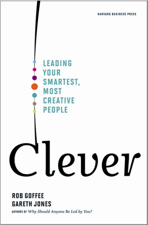What we say...
-
3 Critical Skills to Teach in Leadership Training
Sunday 1st September 2019
-
Leadership, Change and Uncertainty
Friday 6th April 2018
-
What does the Oxfam scandal tell us about organisations
Friday 23rd February 2018
-
I look forward to speaking at The HR Congress
Tuesday 31st October 2017
-
Why should anyone work here - Animation
Friday 11th December 2015
Leading The Brightest
Innovation by your most creative employees is the greatest hope for growing a business. But why is this organisational tribe – "the clevers" – so crucial and how do you manage brilliant but often challenging talents? Two leadership experts offer their views
When [Sir] James Dyson's vacuum cleaner stopped because the bag was clogged, he set out to fix the problem – and hatched a ground-breaking idea for a new machine. The bag-free Dyson Dual Cyclone vacuum cleaner was an instant commercial triumph. Dyson is clever – very clever. Intensely, energetically intelligent. His business has grown on the back of invention, regenerating science and engineering, and his work has created huge value for his company.
Most organisations have their own version of Dyson – or a team of them. They belong to a tribe we call "the clevers" – the smartest, most talented individuals whose skills can produce extraordinary results for your company and the wider economy.
With gloomy economic data in the UK and across Europe and the US, there is a compelling need to develop a growth strategy. Much debate is focused on macro-economic concerns such as government spending. But we suggest a different path. For businesses to expand sustainably they must harness the power of clevers, who are found chiefly in knowledge-intensive businesses such as bio-technology, alternative fuels, hi-tech engineering, software and value-adding services. Such businesses can succeed only with clever people. They are fundamentally about the development of intellectual property based on sustained innovation.
Clevers are not simply those with the most impressive qualifications. They're people with potential to create disproportionate amounts of value from resources they're given. Whether it's the researcher who formulates a ground-breaking drug or the programmer who creates a vital piece of code, innovation from a clever can bankroll an organisation for a decade. The huge personal contribution of clevers to the bottom line is the result of a symbiotic relationship with their company: they need its support and infrastructure and it wants their talent and profit-inducing creativity.
A new style of leader
Clevers don't want to be leaders or to be led. They can be gifted, difficult, and sometimes even dangerous. A company's competitiveness depends on how well they are steered but traditional leadership won't be entirely effective. Smart people need smart leadership: a set of unconventional guidelines for success. Fail to grasp basic insights about managing clevers and you could push your most valuable resource towards competitors.
Clevers are not interested in job titles, so lead by showing your skills and knowledge rather than by pulling rank. You must lead clevers without them realising. Empower as a benevolent guardian rather than micromanage like a traditional boss.
They always deliver but sometimes take their own route. Their journey can seem obscure but leaders need confidence that they will reach the value-added destination. You may begrudge the time required to manage clevers, but if you protect them while giving the space they need to be productive, the reward of watching them flourish and your company progress will make it worthwhile.
Make access to key people quick and easy for them. And remember they believe that every idea of theirs is great. Clevers need to connect with people like themselves. Hire a star professional and young aspiring talent will also want to join you.
Success and failure
Creating a safe environment for clevers is crucial so encourage them to experiment – or even fail. Meanwhile, demonstrate your expertise and authority. Ideally, the successes will more than cover the failures. But if you don't help clevers live with failure, you reduce the chances of more success.
Diageo experimented with rum and coke, rum and blackcurrant and vodka and fruit juice when looking for a product for younger consumers. Then the company's cleverest tried something riskier: citrus-flavoured vodka. The spectacularly profitable Smirnoff Ice was born. Avoid letting clevers become driven by data and risk averse.
Not all innovations can work. When a hi-tech drug fails in the final stages of clinical trials, an inspired leader will send letters of congratulation to team members thanking them and offering encouragement to move on to the next challenge. But never kill off ideas. Google lets employees spend one day a week on their own start-up ideas. The result is speedy innovation that puts large bureaucratic organisations to shame.
Clevers are expensive to support but will reward you by creating value way beyond the support you provide. Give them space to think about an idea and the resources to execute it. And ensure they have structure and discipline. Because clevers are obsessive and take no prisoners they can poison a culture quickly. Keep them clear of admin, and remove barriers that prevent them doing what they do best.
Peer praise
Don't tell clevers how to achieve something, just what needs to be done. Establish goals and let them get on. What clevers do is key to their identity, so recognising achievements is vital. They value recognition from prestigious peers and external clients most – so an industry award or a highly cited paper may be especially rewarding. Recognition could be a public open day or an end-of-week beer with colleagues.
Clevers perform best when given challenges with constraints. Ask them how they could get something done within a timeframe or budget. They have a low tolerance for exaggerated or foolish interaction. Their typically uneasy relationship with organisations makes them super-sensitive to perceived deceit, corporate-speak or double-dealing so transparency is vital.
Have confidence in your own expertise otherwise clevers will sense your unease. Microsoft's Bill Gates emphasises his skills as a programmer while Michael Critelli, former executive chairman of Pitney Bowes, holds several patents in his own name.
Finally, while it's crucial to make your smart individuals feel independent, it's equally important they recognise their inter-dependence. Make it clear that there are others in the organisation who can do things they can't – and whom they need.
Rob Goffee is professor of organisational behaviour at London Business School. Gareth Jones is a fellow of the Centre for Management Development at London Business School and a visiting professor at IE Business School, Madrid.
GET THE MOST OUT OF CLEVERS
Clever people often work best in a team
Even when an individual receives credit, there is usually a high-performing group behind them. Follow these tips to maximise the potential of your brightest talents…
Set a clear course
Create shared goals, inter-dependence and awareness of each other's existence.
Strive for diversity
Top teams in the City are often made up of self-made entrepreneurial salespeople and supremely educated Oxbridge graduates.
Be alert for serendipity
GlaxoSmithKline wanted to become the leading cardiovascular drug company and in the process discovered anti-ulcer drug Zantac.
Expect volatility
Clever teams are full of conflicting ideas.
Understand complexity
Team members commonly lament that their leaders fail to grasp the complicated nature of their work.
Show the bigger picture
It's vital that clevers remain outward-looking.
Set boundaries
Make it clear what the commercial constraints are.
Credit: Director



